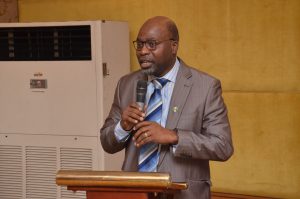Prof. Bolaji Owasanoye, the Chairman, Independent Corrupt Practices and Other Related Offences Commission (ICPC), has cautioned Chief executive Officers (CEOs) of public agencies of the implication of negative decision taken while in office.
Owasanoye said this in Abuja on Thursday at the Executive Session of the chairman of ICPC with CEOs.
The News Agency of Nigeria (NAN) reports that the training was organised by Anti-Corruption Academic (ACAN), the research and training arm of ICPC with the support of MacArthur Foundation.
According to him, the reality is that, there is personal responsibility for every decision, on every action taken while in office.
He said the good thing about the law was that, any bad decision taken today no matter how far it lasted, there would be a day that you must be call upon to face the law.
He further explained that, “the law and order says that, if You go contrary to the law, this is the consequence.
“You took a decision today and it wasn’t the best decision and you get out of that, some day, you will be called upon to answer it.”
The ICPC boss further stated that CEOs were highly exposed to all kinds of pressure which are associated with the ecosystem and the mandates of their appointment itself.
He added that, until you lead an agency, you would not understand the practical pressure of what leadership entails.
“I do not understand how people will build career in a particular field and are globally recognised as experts in their field and when they go to international conferences to present papers the world listens.
“And such people if they get appointed to head one small agency then they become something different.
“How can you ruin the career you built for over 30 to 40 years just because you are given an appointment to head an agency for a period of 4 to 8year, ” he question.
He added that this does not only ruined everything such people built but also the family’s name, its reputation and sometimes implicated their health condition.
According to him, law and order is important because if people are not sanctioned for wrongdoing, there will be no reforms.
“The aims of criminal punishment is not just punishment, there is deterrence and there is reform as well. We have seen not just in Nigeria, but in many countries that the law and and order approach alone is not effective to diminish crime.
“Especially when you are dealing with corruption to stabilise the polity. So, there are prevention measures but more critical is the need for behaviour change.
“If people change their approach to issues, then of course, there will be a marked improvement in the outcomes, ” he added.
Owasanoye further stated that paper qualification was not the most critical requirement for leading an agency, adding that, that does not guarantee success.
“Indeed, if you want to be able to make a determination between people qualification and character, character should be first because with character every other thing falls into place.
“If you have papper qualification without character, the system will collapse.
He further explained that most times, reasons that brought some of these head of agencies, parastatals to ICPC to face trial were mostly avoidable.
He said the conversation with CEOs was important as it would avoid some of these challenges the country was facing.
“This interaction is designed to help us to resolve as part of our prevention mandate and we try to avoid agencies that are in the eye of the storm in our office for the moment so that somebody will not think that this interaction is an aspect of our investigation, it is not.
“You cannot say the peron who stole 50 kobo is less morally guilty than the one who took 1.2 million. Your defence cannot be that everybody is doing it. That is not a recognisable defence.
“It is important for CEOs to take note of some of these few points that are used as discussion points and also to take a look at our National Ethics and Integrity Policy and familiarise yourself with anti-corruption laws broadly speaking in order to avoid truly avoidable default on errors.
“Leadership examples that shapes organisational behaviour are always helpful in devolving the ethical standards that the society so badly needs in order to stabilise and develop.
The Provost of ACAN, Prof. Tunde Babawale, earlier in his address of welcome said the two-day training would help to mainstream social norms and behaviour change approaches into anti-corruption training and research.
According to him, the CEOs participating in this session should also leave with more heightened awareness of issues and principles that will strengthen their capacity to initiate and implement corruption prevention arrangements in their agencies.
He said ACAN being the think-tank of the ICPC, facilitated experience and knowledge sharing sessions with CEOs and senior executives in the public and private sectors.
“This present experience and knowledge sharing session is designed to support the CEOs of public agencies to understand how social norms are a double-edged sword that can either enhance or prevent corruption.
“The feedback from those who attended the previous sessions confirmed that they have learnt a lot from the interactions, and this will impact positively on the Management of their agencies subsequently.
“Our expectation is that the present session will be equally beneficial.
“At the end of this session, CEOs should enjoy the benefit of being better placed to prevent corruption in their organisations and to prevent themselves from stepping on avoidable banana peels. (NAN)


